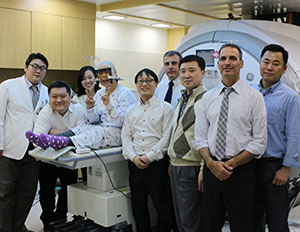|
Dear friends,
 We are excited to start the year by informing you that a major milestone in the evolution of the field of focused ultrasound has been achieved. The first treatment has been successfully performed in a 20-patient pilot study assessing the feasibility, safety and preliminary efficacy of MR-guided focused ultrasound for dyskinesia in Parkinson’s disease (PD). We are excited to start the year by informing you that a major milestone in the evolution of the field of focused ultrasound has been achieved. The first treatment has been successfully performed in a 20-patient pilot study assessing the feasibility, safety and preliminary efficacy of MR-guided focused ultrasound for dyskinesia in Parkinson’s disease (PD).
This trial is the first to use focused ultrasound on a new target within the brain, the globus pallidus. At this time, focused ultrasound is only being assessed to treat one side of the brain, so it will affect dyskinesia unilaterally. If successful, the study could offer an alternative approach for certain patients with Parkinson’s disease who become disabled by dyskinesia, have failed medical therapy and choose not to have a traditional invasive surgical treatment.
This first treatment was conducted by Dr. Jin Woo Chang, Professor & Chairman, Director of Brain Research Institute, Yonsei University Severance Hospital in Seoul, Korea.
"We were able to target the treatment site, and the patient’s tremor, rigidity, dyskinesia and bradykinesia symptoms improved during the procedure without side effects. We will continue to monitor the patient to assess the durability of the treatment benefits."
- Dr. Chang
“We are very pleased that the ExAblate Neuro system has been used for the first time in the globus pallidus internas region of the brain to treat several debilitating symptoms of Parkinson’s disease,” said Eyal Zadicario, Vice President for R&D and Director of the Brain Program, InSightec. “This is another major achievement in the development of focused ultrasound, which offers the potential to provide relief non-invasively to patients suffering from movement disorders. We congratulate Dr. Chang and his team for their pioneering spirit and support of the technology.”
This groundbreaking study is funded by the Focused Ultrasound Foundation and a grant from The Michael J. Fox Foundation for Parkinson’s Research, and is being conducted in collaboration with InSightec and several academic medical centers. We expect the study to begin at sites in the US and Canada this year. Patients enrolled in the study will include those whose adjustments of standard antiparkinsonian therapy have failed to satisfactorily control dyskinesia, who are not candidates for surgery or who choose not to undergo surgery. If the trial is successful, a larger study is planned in advance of seeking FDA approval and reimbursement of focused ultrasound to treat dyskinesia in PD.
This study builds on experience gained during the Focused Ultrasound Foundation-funded pilot trial which investigated focused ultrasound for essential tremor (ET) with positive results and an ongoing study of Parkinsonian tremor. A larger, pivotal trial to apply for FDA regulatory approval to treat ET began last fall and is enrolling patients.
Innovative collaborations like this are critical for accelerating the development of focused ultrasound treatments for the brain. We are grateful to our partners and to our Movement Disorders Steering Committee for their steadfast support.
We look forward to keeping you informed of our progress.
Sincerely,

Neal F. Kassell, MD
Chairman, Focused Ultrasound Foundation
|